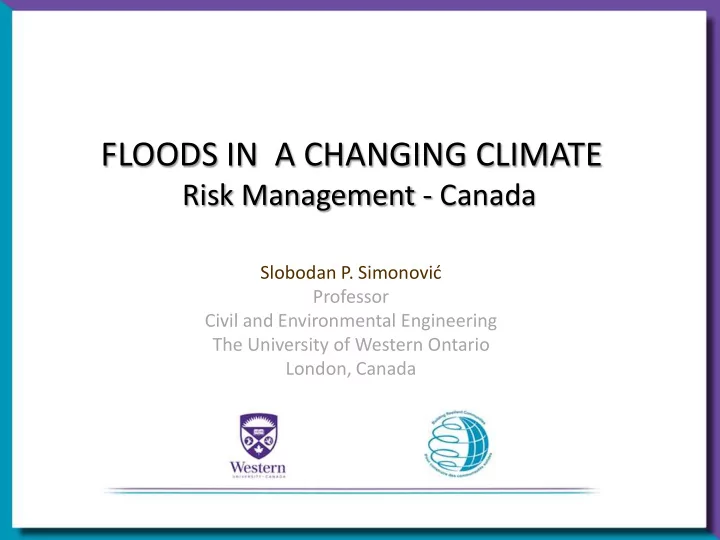

FLOODS IN A CHANGING CLIMATE Risk Management - Canada Slobodan P. Simonovi d Professor Civil and Environmental Engineering The University of Western Ontario London, Canada
2| FLOODS IN A CHANGING CLIMATE Conclusions • Risk management as adaptation to climate change • Use of systems approach • Flood risk management as a social system • Systems tools • Probabilistic approach (Monte Carlo simulation, Evolutionary optimization, Probabilistic MO goal programming) • Fuzzy set approach (Fuzzy rule-based simulation, Fuzzy linear programming, Fuzzy Compromise MO programming)
3| FLOODS IN A CHANGING CLIMATE Outline Introduction Floods in Canada Global change Climate change Floods in a changing climate Risk management as adaptation Systems approach Important messages Public safety ‘Believe’ in climate change General trends Urban flooding Flood insurance
4| INTRODUCTION Floods in Canada 1900-2005 Ontario Quebec British Columbia Alberta
5| INTRODUCTION Floods in Canada 1900-2005
6| CALGARY June 2013 Bow River Peak flow 2,400 m 3 /sec 8 x the regular flow 3 x 2005 flood Elbow River Peak flow 1,240 m 3 /sec 12 x the regular flow 3 x 2005 flood Outflow below Glenmore dam 700 m 3 /sec 7 x the normal 2.5 x 2005 flood 26 communities evacuated 100,000 people affected 20 bridges closed 34,000 people without power
7| CALGARY June 2013
8| TORONTO July 2013 Rain storm 126 mm in two hours (74.4 mm July average) At least 300,000 people affected 1,400 train passengers stranded for hours More than 300,000 people without power Major traffic arteries flooded Insured damage $850 M 2005 storm $671 M 2009 storm $228 M
9| TORONTO July 2013
10| INTRODUCTION Global change Global change (natural and human-induced) Alterations in climate Changes in land productivity Changes in oceans or other water resources Changes in atmospheric chemistry Changes in ecological systems Understanding and predicting the causes, and impacts of, and potential responses to: Long term climate change and greenhouse warming Changes in atmospheric radiation Natural climate fluctuations over seasonal and inter-annual time periods They are all directly related to flooding
11| INTRODUCTION Climate change Climate change Changes in frequency and or intensity of extreme weather and climate events Sea level rise IPCC – many changes in extremes had been observed since 1970s as part of the warming of climate system More frequent hot days, hot nights and heat waves More frequent heavy precipitation events More intense and longer droughts over wider areas Increase in intense tropical cyclones in the North Atlantic Sea level rise Feedbacks
12| INTRODUCTION Climate change Intensification of the hydrologic cycle Further increases in precipitation extremes Increases in heavy precipitation in wet areas Increases in drought in dry areas No precise predictions Current studies suggest that heavy precipitation rates may increase by 5 – 10% per o C of warming Toronto 2005 - $671 M Toronto 2013 - $850 M
13| FLOOD RISK Management – Systems view The system in focus is a social system of: Individuals Organizations Societies and Environment. Flows connecting the subsystems: Resource, and Information. Information is used to determine resource use by information subsystems. resources Values provide meaning to information flows.
14| FLOOD RISK Risk assessment and communication
15| FLOOD RISK Municipal Risk Assessment Tool - IBC
16| FLOOD RISK Risk management – systems approach • Systems tools • Probabilistic approach (Monte Carlo simulation, Evolutionary optimization, Probabilistic MO goal programming) • Fuzzy set approach (Fuzzy rule-based simulation, Fuzzy linear programming, Fuzzy Compromise MO programming)
17| FLOODS IN A CHANGING CLIMATE Important messages Public safety …”The rising cost of natural disasters and the financial burden on Ottawa is the country’s biggest public safety risk ” … Public Safety Canada, 2013‐14, Report on Plans and Priorities
18| FLOODS IN A CHANGING CLIMATE Important messages ‘Believe’ in climate change …“It’s striking that anyone frames the question in terms of ‘belief,’ saying like, ‘I don’t believe in climate change.’ I don’t think this ought to be treated as a religious question. I think it’s better seen as a classic managerial question about decision- making under uncertainty”… John D. Black Professor, Harvard Business School
19| FLOODS IN A CHANGING CLIMATE Important messages General trends More frequent and intense disasters Upper Thames River basin
20| FLOODS IN A CHANGING CLIMATE Important messages Urban flooding An estimate $1.2 B annually ICLR unpublished data
21| FLOODS IN A CHANGING CLIMATE Important messages Flood insurance …Flood insurance in Canada should cover all causes of flooding… …Flood insurance must not incentivize building in flood prone areas and encourage risky behavior… … Flood insurance will require a partnership between the insurance industry, governments and private homeowners... Swiss RE and ICLR, 2010
22| RESOURCES www.slobodansimonovic.com Research Research projects FIDS Research
Recommend
More recommend